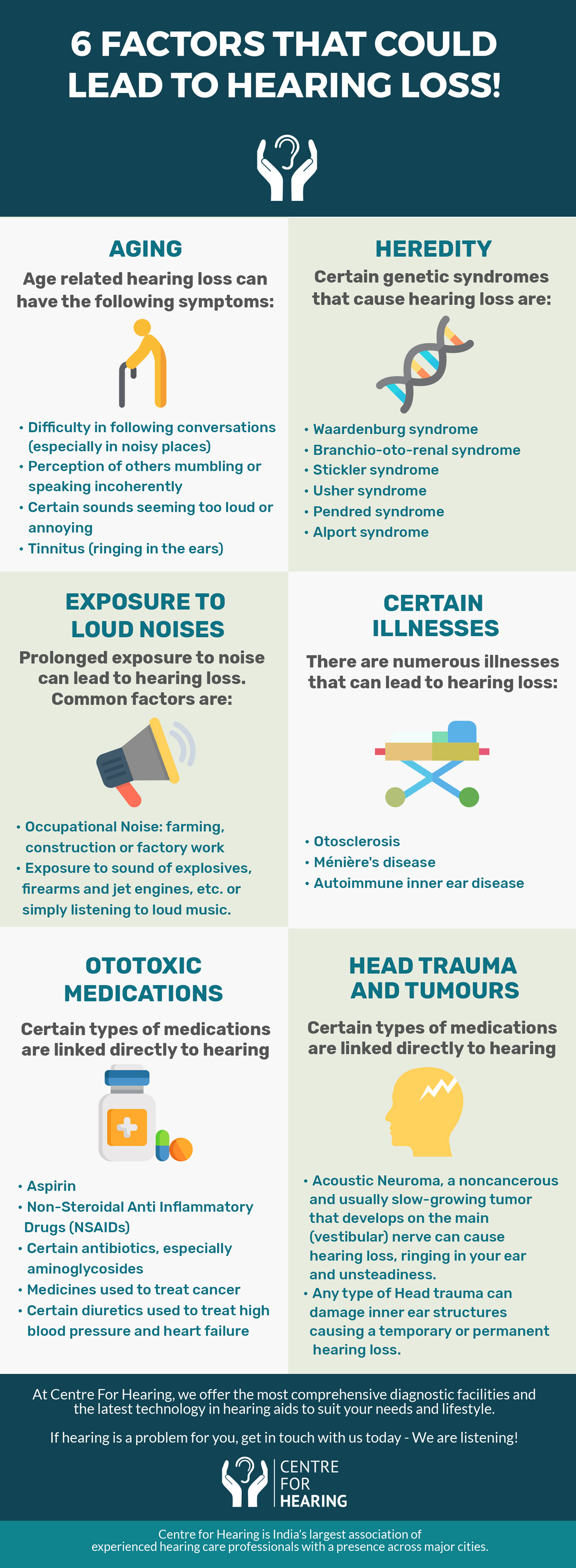“Blindness separates us from things, but deafness separates us from people.” – Helen Keller
Hearing loss does not just affect an individual physically. The psychological impact of hearing loss is just as grave, and might often lead to delays in seeking appropriate treatment. One of the many reasons for this is the social stigma associated with hearing loss. It is often considered to be purely an ‘age-related’ illness. Additionally, the affected individual is usually ridiculed for his/her inability to follow conversations or for asking others to repeat themselves. Hearing aids, especially BTEs, and cochlear implants are conspicuous, and can often result in users being subjected to unwanted attention.
In order to lay these ‘myths’ to rest and to cultivate empathy for hearing impaired individuals, it is necessary to take a detailed look at the factors that could lead to hearing loss. Here are some of them.
6 Factors That Could Lead To Hearing Loss!
While age-related hearing loss is commonly known, there are many other factors that could lead to a loss of hearing.

1. Aging:
Age-related hearing loss, or presbycusis, refers to the gradual loss of hearing that occurs over time. Hearing loss caused by aging is generally greater for high-pitched tones, such as the chirping of birds or the ringing of a telephone. It usually occurs owing to changes in the inner ear as a person grows older. Changes in the middle ear or the nerve pathways leading to the brain can also result in age-related hearing loss. High blood pressure or cardiovascular conditions could also result in this type of hearing loss.
It usually affects both ears, equally and gradually. Some of the common symptoms include:
- Difficulty understanding conversations (especially in noisy places)
- Perception of others mumbling or speaking incoherently
- Certain sounds seeming too loud or annoying
- Tinnitus (ringing in the ears)
2. Heredity:
Hereditary hearing loss can be sensorineural, conductive or mixed, and is the result of a genetic trait passed down by a parent. There are around 400 known genetic syndromes that include hearing loss, some of which are:
- Waardenburg syndrome
- Branchio-oto-renal syndrome
- Stickler syndrome
- Usher syndrome
- Pendred syndrome
- Alport syndrome
While many hereditary hearing losses are congenital (present at birth), some of these conditions develop over time.
3. Exposure to Loud Noises:
Prolonged exposure to noise can lead to noise-induced hearing loss. The culmination of constant exposure to the following can negatively impact your hearing:
- Occupational Noise: Jobs where loud noise is a regular part of the working environment, such as farming, construction or factory work, can damage the cells of your inner ear.
- Recreational Noise: Exposure to noise from explosives, firearms and jet engines, can cause immediate, permanent hearing loss. Other recreational activities with dangerously high noise levels include snowmobiling, motorcycling or listening to loud music.
While noise-induced hearing loss is generally temporary in nature, repeated exposure to loud noise makes it harder for the ears to recover between events. The noise damages inner ear hair cells, causing hearing loss to deteriorate over time and become permanent. It is possible to lower the risk of noise-induced hearing loss by taking precautions such as wearing ear-plugs in noisy environments, turning down the volume on personal music devices, etc.

4. Certain Illnesses:
There are numerous illnesses that can lead to hearing loss. Some of them are listed below:
- Otosclerosis: This disease affects the movement of the tiny bones in the middle ear to move and causes conductive hearing loss. This condition can be treated with surgery.
- Ménière’s disease: This is an inner ear problem that usually occurs in people between 30 and 50 years old. A person with this disease will often have sensorineural hearing loss. While the cause of this disease is unknown, the symptoms usually include fluctuating hearing loss, vertigo, and Tinnitus.
- Autoimmune inner ear disease: This is a syndrome of progressive hearing loss and/or dizziness that is caused by antibodies or immune cells which attack the inner ear. In most cases, there is a reduction of hearing accompanied by Tinnitus which occurs over a few months.
5. Ototoxic Medications:
Certain types of medications are considered to be linked directly to permanent hearing loss, some of which are mentioned below:
- Aspirin
- Non-Steroidal Anti Inflammatory Drugs (NSAIDs)
- Certain antibiotics, especially aminoglycosides
- Medicines used to treat cancer
- Certain diuretics used to treat high blood pressure and heart failure
Generally, only large quantities of these drugs could lead to visible effects of hearing loss.
Research is still being conducted to further understand the impact of specific dosages and medications.

6. Head Trauma And Tumours:
One of the factors that could lead to hearing loss is the development of Acoustic Neuroma. It is a noncancerous and usually slow-growing tumor that develops on the main (vestibular) nerve leading from your inner ear to your brain. Branches of this nerve directly influence your balance and hearing, and pressure from an acoustic neuroma can cause hearing loss, ringing in your ear and unsteadiness. These tumors can be treated either medically or surgically. However, there are no guarantees that the hearing will be fully restored.
Any type of Head trauma can damage inner ear structures causing a temporary or permanent hearing loss. Any injury sustained to the head should be evaluated by a doctor immediately, which will generally include eye and hearing examinations.
It is important to remember that hearing loss can result from any of the above factors and that it shouldn’t be taken lightly.
If you, or a loved one, suspect being affected by hearing loss, get in touch with Centre For Hearing today! With our comprehensive diagnostic facilities and the expertise of over 50 RCI certified audiologists, we assure you the best services and treatment!
Call us on +919811227269 for FREE CONSULTATION!
Locate a Hearing Aids Centre Near You:

